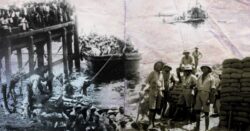The Imperial War Museum is seeking to fill the gaps in its collection of wartime stories (Pictures: Imperial War Museum/Getty)
The stories of minority soldiers who fought for the British Empire in World War I need to be preserved before they are lost forever, a leading historian has said.
Alan Wakefield, Head of First World War at the Imperial War Museum, explained how Black British soldiers in particular have been deliberately forgotten.
Most of the attention tends to focus on the Western Front, the conflict’s main theatre, but Black units were barred from fighting there so as not to undermine colonial rule by allowing them to serve alongside – and kill – white soldiers.
Instead, they were made to dig trenches or sent to fight far away in Africa or the Middle East, where enemy combatants were also non-white. And despite playing a pivotal role in the Allied victory, their efforts were then deliberately scrubbed from the history books in a bid to safeguard the status quo.
That was made most obvious a year after the war ended when thousands of soldiers marched solemnly past the Cenotaph to pay their respects to fallen comrades.
Photos taken at the time show British, American, French, Belgian and Greek troops present, but no Black units from the West Indies or Africa were invited to take part in the procession.
Mr Wakefield told Metro.co.uk: ‘What we’re trying to do at the Imperial War Museum is trying to look at the collections and say right, where are the gaps?
‘What materials don’t we have? What stories can’t we tell very well?’
One is that of minority soldiers, in particular Black servicemen.
Troops of the West Indies Regiment in camp on the Albert – Amiens road in September 1916 (Picture: Imperial War Museum)
When Britain declared war on Germany in August 1914, the British Empire was the largest in the world and at the height of its power. Mr Wakefield describes how once we entered the conflict ‘basically the whole Empire was at war’.
Minority soldiers from the UK and its territories signed up for myriad reasons, including a sense of patriotism, to escape poverty in their homeland, or simply to continue a family tradition of being in the Army.
But Whitehall officials ‘weren’t very supportive of the whole idea’ of enlisting colonial citizens.
Mr Wakefield went on: ‘On the Western Front, the British wanted to keep the war as what they would call a white man’s war, so they wanted Europeans fighting Europeans.
‘The main reason for that was because they didn’t want to undermine the colonial hierarchies.
The 2nd Battalion, West India Regiment, embarking for service in East Africa (Picture: Imperial War Museum)
‘Basically, colonial rule was based on a sort of having white administrators and white government over the local population.
‘Once you start arming colonial citizens and allowing them to kill Europeans, it basically shows that everybody is equal.
‘And also, you have trained up a lot of people who when they go home and don’t like the status quo may well take up arms again and they will know how to use them and there could be a lot of problems for colonial authorities.’
William Robinson Clarke: The only known Black fighter pilot
Among those who did manage to see frontline combat was William Robinson Clarke, or Robbie Clarke, who worked as a chauffeur and mechanic in Jamaica before coming to the UK and asking to join the Royal Flying Corps.
Mr Wakefield said: ‘He initially gets a job as a driver and a mechanic but he eventually gets spotted as having potential because to become a pilot you had to be recommended for that by your commanding officer, so you would have to get at least a couple of officers would have had to put him forward for training.
‘So, he was obviously someone who was marked out as somebody with the potential to do that job.
‘There were a hell of a lot of people in the RFC who get nowhere near an aeroplane, so he’s obviously got something about him where they think yes, he’s the sort of guy who could do this.’
Clarke joined No 4 Squadron flying an R.E.8 two-seater reconnaissance plane.
But he didn’t serve as a pilot for very long, having been shot down in what became known as ‘Bloody April’ in 1917.
More than a century later, Clarke is still the only Black pilot known to have served in the British Army in World War I.
Mr Wakefield said: ‘There were a couple of Indian fighter pilots who served. I think they learned to fly in India pre-war, so they obviously came from relatively pretty well-off families in India.
‘But Robbie Clarke as far as we know he was the only Black pilot.
‘It would be fantastic to find out that that assumption is wrong and there were others. It wouldn’t surprise me if there were others. It would only be a handful.
‘It’s like all of history – there’s a lot of it still waiting to be uncovered and you just need that one document or one photograph or one piece of evidence to actually turn up, and then it changes all focus.’
Rather than being sent to fight, many Black servicemen were deployed as labourers.
Mr Wakefield said: ‘In any war, you can’t keep an army in the field fighting if you can’t supply it.
‘So, you need somebody to load and unload all the supplies, you need somebody to maintain the transport network to get the supplies to the front, you need other people to build camps to house troops, you need people to dig defensive positions, gun positions, all of this work has to be done.
‘But it obviously can’t all be done by soldiers who are fighting because otherwise there’d be none fighting, so you need a huge support army of labourers just keeping the men in the field, and that role on the Western Front is done by a vast array of people.
‘It’s done by the British Army’s labour corps, Army service corps, British West Indies Regiment are there, there ae Egyptian labourers, there are South African labourers, the Chinese labour corps.’
A British West Indies Regiment soldier receiving the Military Medal in 1917 (Picture: Imperial War Museum)
Mr Wakefield said this is another of the reasons that tales of many soldiers – Black and white – are often forgotten.
He described how we tend to remember the fighting soldier rather than those working behind the scenes to keep the war machine moving.
Academics and historians have only come to see logistics as vital ‘in relatively recent years’, he said, adding: ‘Without this, you can’t fight the war.’
He continued: ‘There were 228,000 British soldiers in Greece in the First World War, and if nobody knows about them – if nobody knows about 228,000 white British soldiers then they’re not going to know about thousands and thousands of Africans fighting in East and West Africa or supporting operations in the Middle East.
‘There’s very much a sort of hierarchy in what we remember about the First World War and primarily it’s people fighting on the Western Front.
‘Then some people know a little about Gallipoli, you might know we captured Jerusalem, but nobody really knows much about the makeup of those forces.
‘So if we’ve forgotten a lot of the white British soldiers in the First World War, if we’ve forgotten them, what chance was there that the service of other people is going to be remembered?’
Men of the British West Indies Regiment creating dugouts in Palestine (Picture: Imperial War Museum)
Mr Wakefield added: ‘It would be great to find another pilot or observer from the RFC, but also it would be great just to find anybody who had stuff about Black or Asian servicemen in the army or navy in the First World War, because apart from photographs – photographs and a little bit of film footage – it is a very underrepresented story.
‘It was a world war. This was a world war, and I think we forget that. We focus on the Western Front in Belgium, but it’s a world war. There’s people from all over – the British Empire and other European empires who were involved and dragged into this fight, this global struggle.
‘We do need those stories, because it’s a shared history and in sort of modern Britain we really need to represent the whole of society. That is what we should be doing
‘If it is just a single photograph or a single letter or whatever – just the fact that it survives you can get it into a national collection, then we can help tell those stories in a much more complete way.’
Get in touch with our news team by emailing us at [email protected].
For more stories like this, check our news page.
Alan Wakefield, Head of First World War at the Imperial War Museum, says Black British soldiers in particular have been deliberately forgotten.





